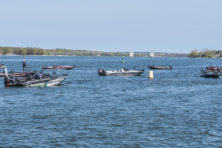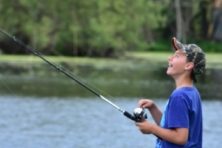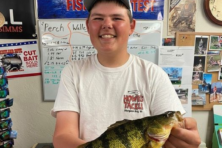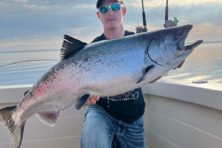Wild Things: Youth Coastal Fishing Program Act Introduced
- Share
- Tweet
- Pin
- Share

Federal grants could get more kids on the water here
by KEVIN NAZE, [email protected], Peninsula Pulse contributor
A new proposed federal program aims to get more youths involved in coastal fishing, and the Great Lakes are included in the bill.
Introduced earlier this month, the Youth Coastal Fishing Program Act would create a new grant program to fund community-based efforts that take youth fishing in oceans and the Great Lakes. It authorizes $2 million for each of the next five fiscal years – administered by the National Oceanic and Atmospheric Administration – to award grants for youth-fishing projects.
Included would be things such as fishing-equipment purchase or rental, guide costs and license purchases, the cost of transporting participants to and from a youth-fishing project, and fees associated with boat rental, pier access or other facilities.
In awarding the grants, priority would be given to applications containing proposals for youth-fishing projects focused on underserved communities. Although that might sound like it could preclude our area, it would seem entirely possible to get a grant to bring youths from urban areas here for charter fishing trips or shore fishing education.
According to the American Sportfishing Association, this program could set youths on a path of participation in outdoor recreation by giving them experience they otherwise may never receive. By improving equitable access to nature, youths would gain experiences on the water that allow them to interact first-hand with the environment while learning about marine science and environmental stewardship.
Eligible grant recipients would be nonprofits, educational institutions and state, local and tribal governments. Projects must include a recreational fishing experience in tidal river, coastal, ocean or Great Lakes waters; education about marine science, conservation and fishing regulations; and information about where and how to continue fishing.
Research shows that nearly 90% of current fishing participants started before the age of 12, which highlights the importance of being exposed to fishing at a young age. Access to nature can be a challenge, however – particularly for Black, Indigenous and people of color (BIPOC) communities; individuals with access and functional needs; and those affected by poverty.
A bipartisan group of U.S. representatives and senators introduced the Youth Coastal Fishing Program Act of 2023.

Hunt Wild’s Swan Song
In a surprising move, the Department of Natural Resources announced Tuesday that the popular Hunt Wild mobile app will be retired as of June 29. I reached out to a DNR contact but couldn’t get any official comment. It’s a head scratcher for sure, even if it’s for budgetary reasons.
Launched in 2018, the free app is a valuable, easily accessible resource for hunters. Some have used it simply to find daily shooting hours or to register a deer, bear or wild turkey. Others have explored public lands, brushed up on regulations or used the mobile mapping feature.
Via a press release Tuesday, the agency said the app “has reached the end of its life cycle” and that hunting and regulation resources could be found on the DNR’s hunting website. The DNR said that next month, hunters will be able to download a copy of the new 2023-24 combined rules and regulations from the hunting webpage for offline access.
Current users of the app will be able to open and access data stored in their app until June 29.
Salmon Derby June 30 – July 2
The 48th annual Northeastern Wisconsin Great Lakes Sport Fishermen Salmon Derby is set for June 30 – July 2 at Manitowoc. There are prizes for the top five fish in each division, daily prizes and a Super Derby boat tournament. Get the details at newglsf.org.
Weekly Water Levels
Green Bay and Lake Michigan water levels are unchanged in the past month, but they have dropped five inches during the past year and 30 inches since the record June high set in 2020. Levels last week were still five inches above the 100-year average.




